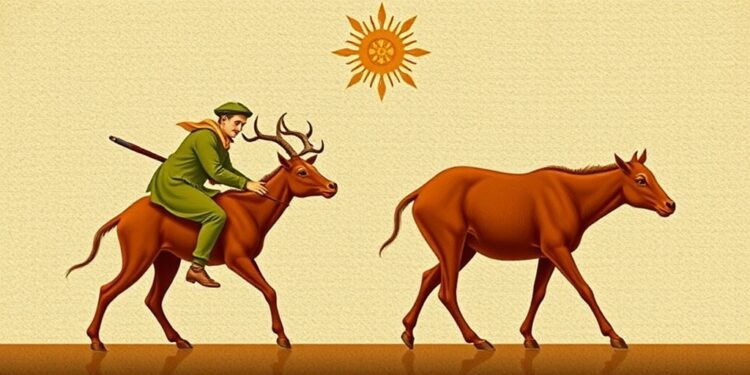A groundbreaking study has emerged from a collaboration among several esteemed research institutions, shedding new light on the monumental transition from hunting and gathering to agriculture—a pivotal shift that has long shaped human civilization. Traditionally, scholars have attributed this profound change primarily to environmental factors such as climate shifts and rainfall patterns. However, the latest findings indicate a far more complex interplay, tightly woven with social dynamics and human interactions.
Researchers hailing from the University of Bath, the Max Planck Institute for Evolutionary Anthropology, the University of Cambridge, UCL, and other notable entities have meticulously developed a mathematical model that challenges the long-held belief that external environmental forces alone propelled the transition to farming. This innovative approach not only highlights the agency of human populations during this time but also underscores the competitive and cooperative interactions that defined early human societies.
The research team implemented a mathematical framework originally crafted to examine predator-prey dynamics. By doing so, they were able to scrutinize how early agricultural practices and hunter-gatherer lifestyles could have influenced each other. This groundbreaking model goes beyond merely presenting a causal relationship; it elucidates how demographic interactions between hunter-gatherers and the nascent farming communities fostered cultural exchanges and migrations that ultimately led to the establishment of agriculture.
What sets this study apart is its emphasis on understanding human behavior as a dynamic element within broader ecological and sociocultural contexts. The researchers posited that varying population growth rates and mortality rates—conditions rife with competition for resources—played a pivotal role in shaping agricultural practices. The implications of these findings extend far beyond the mere act of farming, inviting a reevaluation of how human societies have historically interacted with their environments and each other.
The University of Bath’s Dr. Javier Rivas speaks to the significance of these revelations, articulating how the research provides a nuanced understanding of prehistoric societies. In his words, “By statistically fitting our predator-prey model to observed population dynamics inferred from radiocarbon dates, we explored how population growth shaped history.” This insight reveals a landscape where competition and cooperation intertwined, influencing how agricultural spaces were established and expanded.
Moreover, the findings signal a shift in how we perceive early migration patterns and cultural diffusion associated with agricultural innovation. The study highlights that early farmers did not merely cultivate new lands but actively engaged with hunter-gatherer populations, compelling them to adapt and transform their longstanding lifestyles into ones more conducive to settled agricultural practices. This dialectic between early farming societies and their hunter-gatherer counterparts illustrates a form of cultural evolution driven by necessity and competition.
Dr. Rivas also expands on the broader implications of these findings, suggesting that the methods employed may serve as a foundational toolkit for deciphering human interactions across various historical epochs. The researchers intend to refine their model and examine larger geographical areas, potentially illuminating other key transitions in human history beyond just the emergence of farming.
The crux of the study rests on understanding how migration and cultural amalgamation played integral roles in the rise of agricultural societies. The sheer scale and complexity of these interactions may well redefine our perceptions of human evolution and development, illustrating that our past is not solely dictated by climatic or geographical changes but also by our capacity for cultural adaptation and social negotiation.
Furthermore, the study’s emphasis on demographic variability captures the essence of human resilience and adaptability. It reveals that even in early stages of societal development, humans were not merely subject to their environment but actively influenced it through their decisions and social structures. This perspective is particularly relevant today as we confront global challenges that echo those ancient dilemmas of survival and resource allocation.
In a world rife with pressing social and environmental issues, the study’s insights offer a profound reminder of our shared history and collective potential to innovate and adapt. As we navigate the complexities of modern civilization, understanding the historical interplay of demographics, culture, and agriculture will be invaluable in guiding our approaches to sustainability and resilience in contemporary society.
Ultimately, this research does not just alter our understanding of past human societies; it also provides a framework through which we might view our future. With an eye toward leveraging historical insights to inform our modern challenges, the project champions a holistic view of humanity—one shaped by both competitive instincts and collaborative tendencies that have driven our species through millennia.
As the research team prepares to further develop their model and test it across various regions, the potential for future discoveries remains enticing. It is an invitation for scholars and enthusiasts alike to delve deeper into the understanding of how human agency has sculpted the landscapes of history, revealing layers of complexity that are reflective of the rich tapestry of cultures that have emerged and evolved over time.
This dynamic investigation into our agricultural roots serves not only as a study of the past but as a vital exploration of how history informs our present and will continue to shape our future.
Subject of Research: Human interactions in the transition from hunting-gathering to farming
Article Title: Demographic interactions between the last hunter-gatherers and the first farmers
News Publication Date: 31-Mar-2025
Web References:
References:
Image Credits:
Keywords: Farming, Hunter gatherers, Agricultural development, Cultural evolution, Demographic interactions, Human agency, Migration, Social dynamics, Evolutionary history.




